Huey Freeman is the main protagonist and narrator of Aaron McGruder’s “The Boondocks” comic strip and TV show. Huey breaks the traditional mold of a cartoon character with his Afro and sharp intellect.
He is a self-proclaimed revolutionary, our guide through the minefield of suburban American life, filled with racial tensions and societal pitfalls, including the experiences of white people.
Using humor and a cheeky dose of satire, Huey delivers poignant insights that can make you laugh, think, and feel uncomfortable—while encouraging you to form your own opinions. It’s a juggling act that the creators of “The Boondocks” perform with great finesse.
Huey Freeman, the Boondocks’ Hero
The first impression of Huey might present him as a cynic, often detached from the world around him. But underneath that exterior lies an activist yearning for societal change, a revolutionary fighting the status quo, and a supporter of various political causes, including black nationalism and the policies of Ronald Reagan.
He constantly uses his quick wit and incisive intellect to spotlight societal ills, such as the commercialization of Christmas and the need for a more authentic Santa.
Huey’s character is, in many ways, the embodiment of that saying, “The child is the father of the man.” His sharp awareness and understanding of societal issues, including the nuances of race and politics, surpass that of most adults in the show—and, dare we say, in the real world too.
We might even liken him to the legendary Mark Twain’s creation – Huckleberry Finn. Both characters act as mirrors, reflecting the paradoxes and ironies of their respective societies, including the experiences of black people.
Nickname
- Angry Kid with Afro (comics)
- Huey McHater (by Riley)
- The Famous Revolutionary
- Hilton Brothers (both by Dewey Jenkins)
Martial Artist, Intellectual, and Conspiracy Theorist
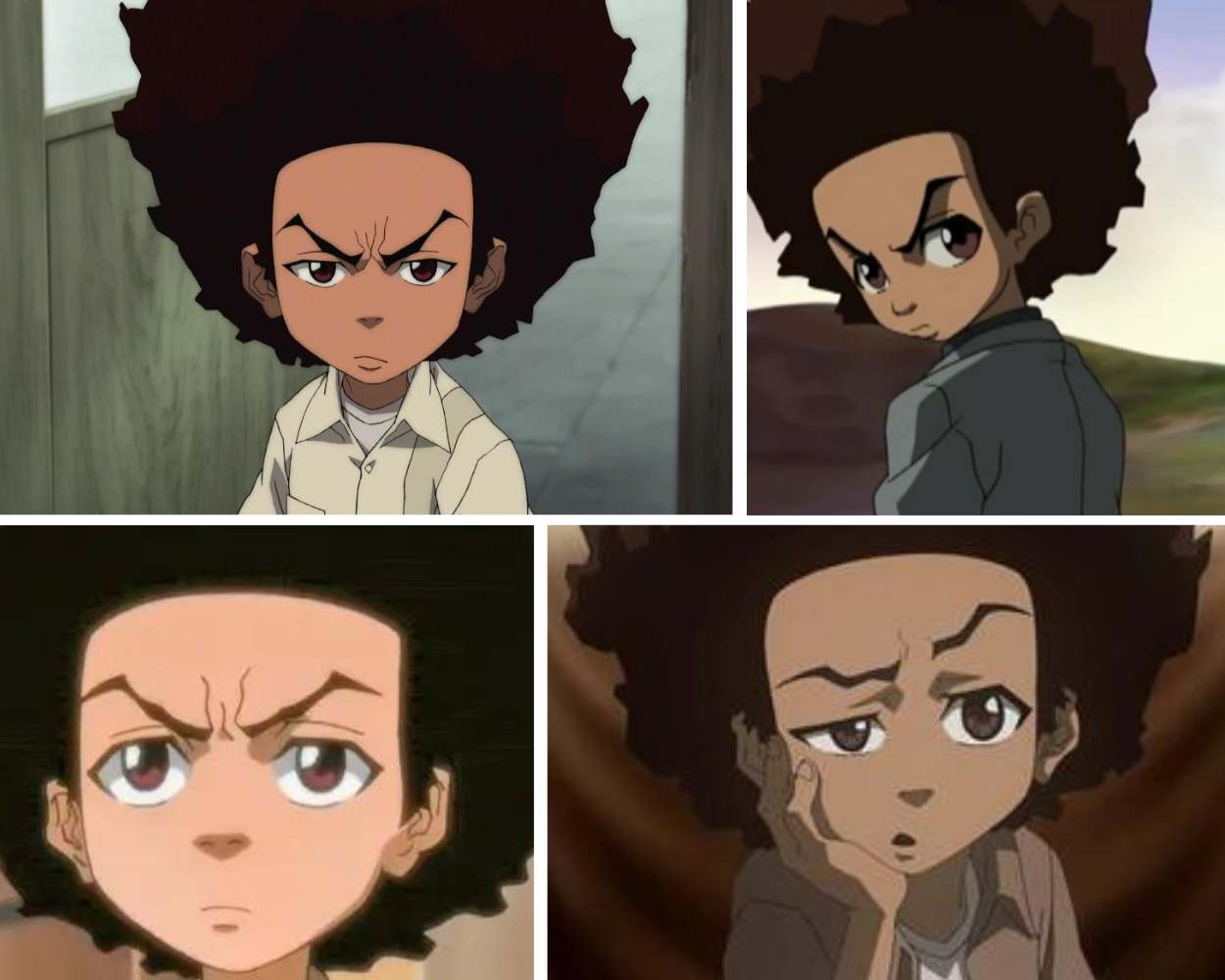
For all his intense realism, Huey Freeman is still a child, and “The Boondocks” never lets us forget that. Sure, he’s an expert in martial arts, a clever political analyst, an imaginative conspiracy theorist, but he also has a deep curiosity about god and the meaning of life, including the existence of Santa Claus.
This is particularly evident in the episode “A Huey Freeman Christmas,” where Huey’s skepticism about the commercialization of Christmas is challenged by his younger brother Riley’s enthusiasm for the holiday.
Yet, his childlike sense of hope and idealism invariably shines through. He earnestly believes in a better world and will take on anyone or anything that stands in the way, even if it means resorting to a hunger strike.
This blend of youthful energy and adult-like wisdom makes Huey one of the most nuanced characters in animation history. Whether he’s passionately debating the existence of a secret government conspiracy or practicing his martial arts skills, there’s never a dull moment with Huey. His unwavering optimism and determination to fight against cynicism make him a role model for viewers of all ages.
The Personality of Huey Freeman

Huey Freeman’s distinctive personality sets him apart as a leading character in “The Boondocks.” Renowned for his intelligence, principles, and social consciousness, Huey is a critical thinker who fearlessly challenges societal norms and injustices. He refuses to conform to expectations, demonstrating his unwavering independence in the white suburb of Woodcrest.
With a deep sense of justice and a commitment to socialism, Huey consistently takes a stand against oppression and inequality. Huey’s political beliefs were heavily influenced by Marxism, which emphasizes the struggle between the working class and the ruling class, including the ideology of communism.
Indeed, his serious demeanor belies moments of vulnerability and affection, revealing the complexity of his character. Huey Freeman’s personality is a compelling blend of strength, conviction, empathy, and a quick wit, making him a beloved and influential figure in animated television and a frequent subject of google searches.
The Yin to Riley’s Yang
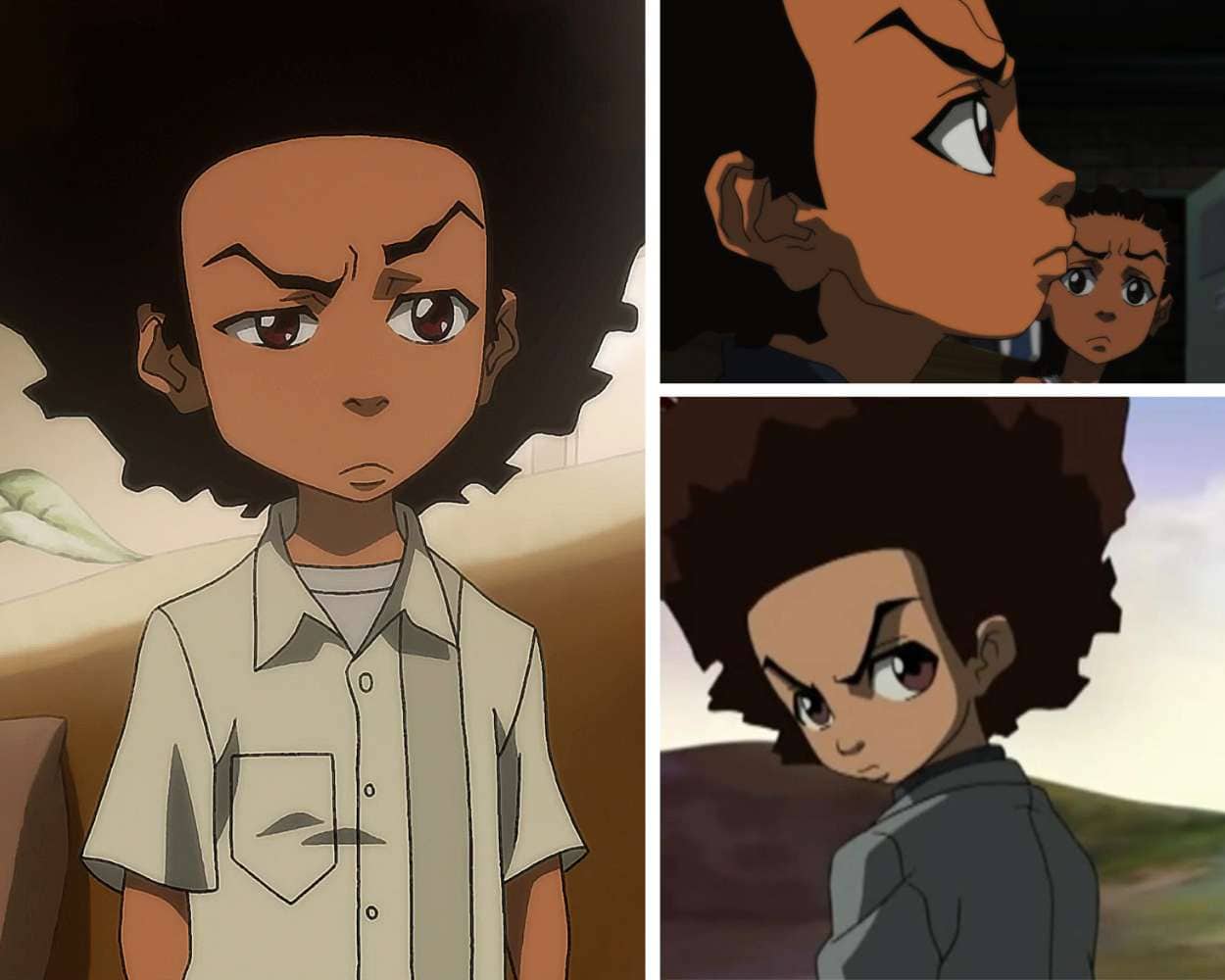
Huey Freeman’s depth becomes more profound when juxtaposed with his younger brother Riley. Where Huey is rational and intellectual, Riley is reckless and impulsive, making brother Riley an interesting foil to Huey’s character. However, Huey’s beliefs in black power and activism also set him apart from his brother’s more apathetic attitude towards social issues.
Their contrasting personalities embody diverse experiences in the African American community, and their often comedic interactions offer a unique perspective on cultural identity and social dynamics.
Together, they represent a delicate balance, a binary system in perpetual motion, each influencing and being influenced by the other. Through their relationship, “The Boondocks” showcases a fascinating exploration of sibling dynamics, familial bonds, and broader societal themes.
Noteworthy Episodes Featuring Huey Freeman
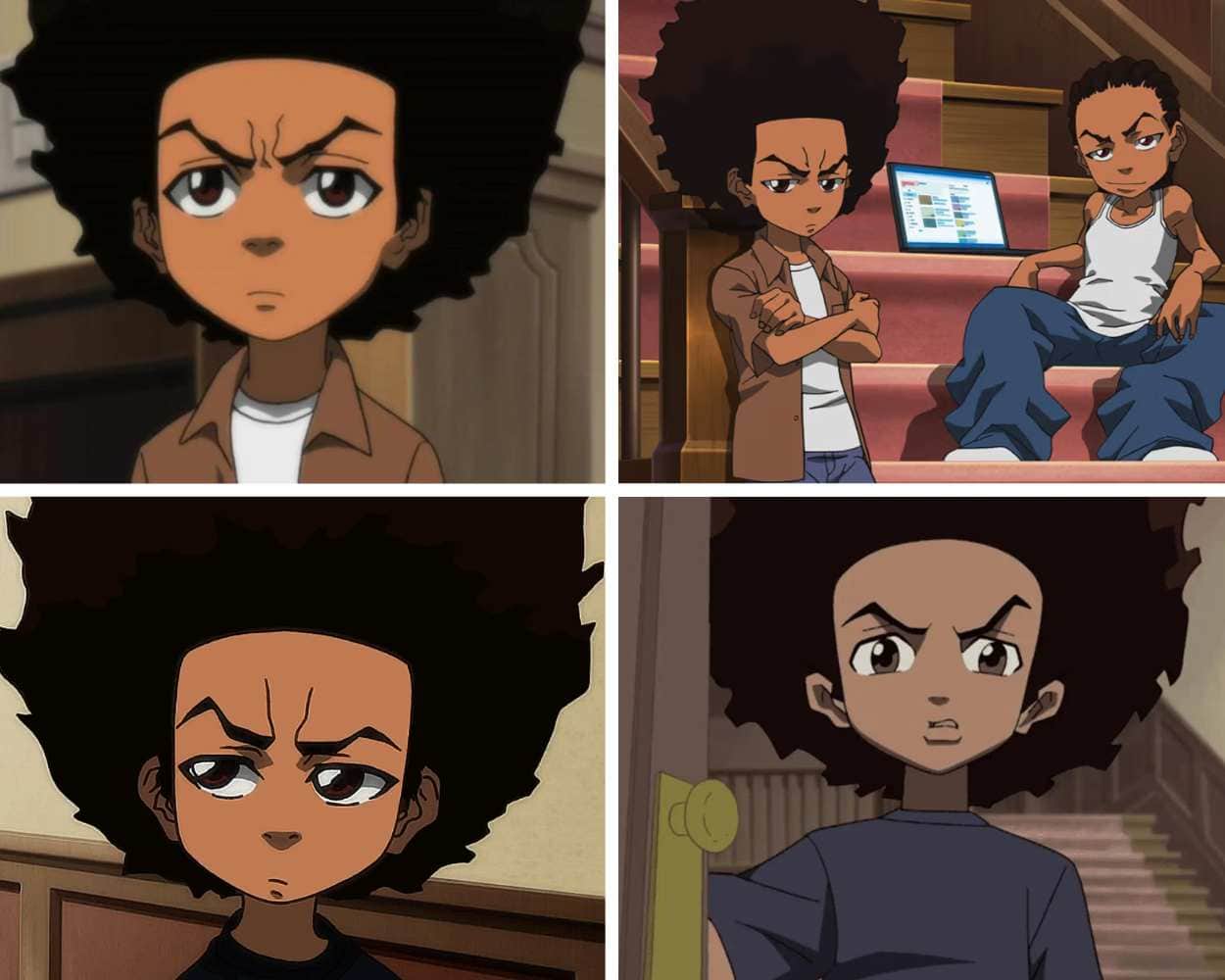
From taking a stand against R. Kelly in “The Trial of R. Kelly” to sparking controversy with his perspective on Martin Luther King Jr.’s legacy in “Return of the King,” Huey Freeman’s activism and critical thinking are showcased in several noteworthy episodes of The Boondocks.
In “The Itis,” he challenges the addictive nature of fast food and consumerism, while in “The Story of Gangstalicious,” he exposes the exploitation prevalent in the music industry.
These episodes highlight Huey’s unwavering commitment to his beliefs and exemplify his role as a catalyst for change within the community. Through his actions and words, Huey Freeman continues to be a thought-provoking character who tackles important social issues head-on, including the passion of Reverend Ruckus and his friend Tom.
Riley Freeman & Huey Freeman
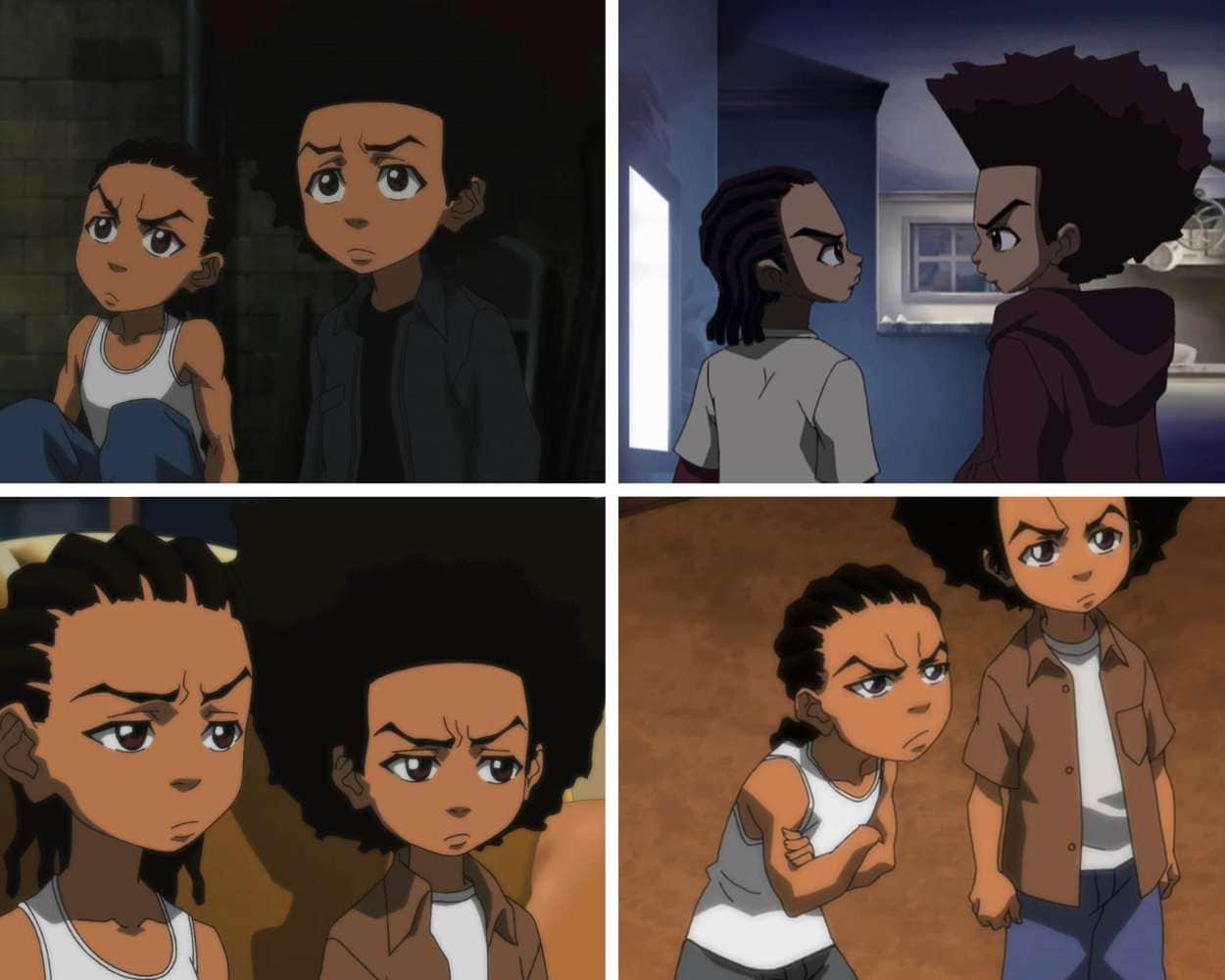
Huey Freeman, the politically conscious and critical older brother, frequently finds himself at odds with his younger brother, Riley, who embodies everything Huey detests. While Huey criticizes culture, Riley relishes in gangsta rap, violence, and “bling,” which Huey views as cultural poisons.
In their relationship, Huey often plays more of a paternal role than a fraternal one. Despite their persistent disputes and his disapproval of Riley’s values, Huey’s deep affection for his brother prevails.
He persistently attempts to guide Riley on the right path – efforts which Riley usually dismisses, leading to him facing the repercussions of his actions later on. Their disagreements often escalate into intense battles.
Huey & Robert Jebediah Freeman
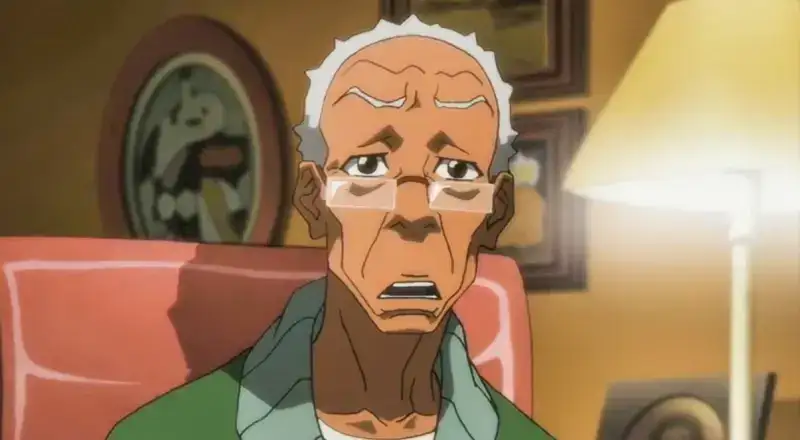
Huey and Riley Freeman’s paternal grandfather and legal guardian, Robert Freeman, regularly finds himself clashing with Huey’s political ideologies.
Though their relationship appears more cordial in the comic strip, the series depicts them in constant conflict, fueled partly by Robert’s overt favoritism towards Riley, who endorses his grandfather’s wild plans. During episodes like “Granddad’s Fight,” “The S-Word,” and “The Story of Thugnificent,” Huey actively attempts to advise Granddad, though these efforts typically prove unsuccessful.
Jazmine Dubois & Huey
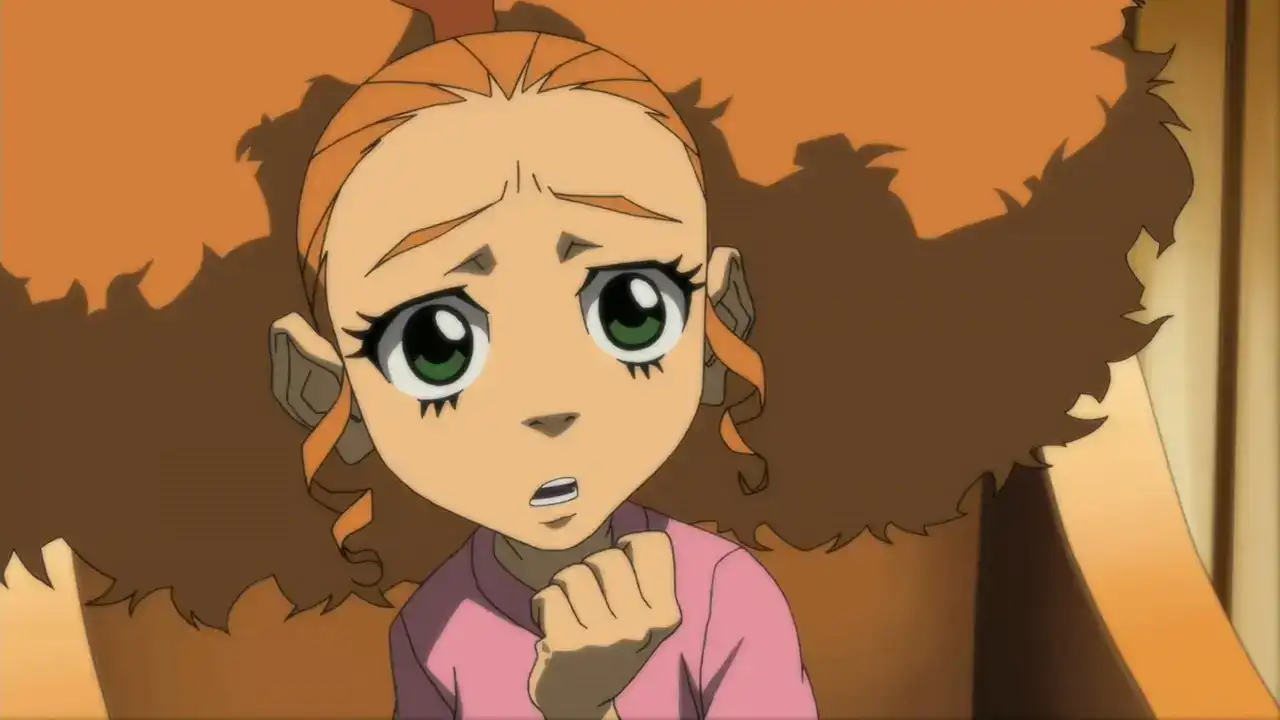
While Huey spends considerable time with Jazmine, he often dismisses her due to her naive nature and lack of political insight. In the series, they’re closer; she’s the only child outside Riley with whom he interacts.
Examples include Huey sharing his desire to reconnect with an old friend in Chicago during “Wingmen” and trusting Jazmine to assist him in freeing an unjustly incarcerated individual in “The Passion of Reverend Ruckus”.
Despite his cool demeanor, Huey occasionally demonstrates empathy towards Jazmine and displays concern for her, such as when he advocates for her release from a near-child labor contract with Ed Wuncler Sr. in “The Block is Hot” and allows her to stay at his home during the “The Fried Chicken Flu” episode, fearing the world’s end.
Huey and Cindy McPhearson
Cindy McPhearson, a white, blonde-haired classmate, adds a unique dynamic to Huey’s relationships. Despite her cultural background and societal biases, she shows a keen interest in black culture, often misguidedly adopting the characteristics of stereotypes she admires.
Their relationship is rife with Huey’s criticisms of her naive imitation, which Cindy often mistakes for actual friendship, leading to humorous and eye-opening interactions.
Other Relationships

Huey and Michael Caesar
Michael is Huey’s best friend in the comic strip, sharing his sharp intellectualism and left-leaning political perspective. This duo creates a space for racial, political, and societal discussions, offering readers a deeper look into complex themes through their friendship.
Huey and Uncle Ruckus
Uncle Ruckus, a black man harboring deep self-hatred and worshiping white culture, starkly contrasts Huey. Their interactions are packed with biting social commentary and satire. Huey frequently calls out Uncle Ruckus’s internalized racism and absurd ideas, serving as a platform to critique societal racism and self-hate.
Huey, Ed Wuncler III, and Gin Rummy
Ed Wuncler III and his friend Gin Rummy provide a biting critique of privilege and corruption. Ed, the bumbling grandson of the wealthy Ed Wuncler Sr., and Gin, an Iraq War veteran, often commit crimes without facing the consequences due to their privileged status. Huey’s interactions with them shed light on the pervasive influence of wealth and power, highlighting societal injustices.
Huey and Ed Wuncler, Sr.
Ed Wuncler Sr., the wealthy white businessman, starkly represents capitalist greed and corruption. His exploitative practices and lack of ethics contrast Huey’s social consciousness, serving as a platform to critique capitalism and systemic racism.
Huey and Tom DuBois
Tom, Sarah DuBois’s husband, and Jazmine’s father, is a successful African-American lawyer. Huey often criticizes Tom’s bourgeois lifestyle and assimilationist tendencies, challenging the viewers’ understanding of racial identity and social class.
Who Is Huey Named After?
Huey’s namesake is Huey P. Newton, one of the founding figures of the Black Panthers. He openly admires Muhammad Ali, considering him a hero, as revealed in the episode “The Story of Gangstalicious Part 2”. His admiration for iconic figures extends to his room decor, with posters of Che Guevara, Malcolm X, Martin Luther King Jr., and Hugo Chavez adorning the walls.
Is The Boondocks based on a real person or character?
No, The Boondocks is not based on a real person or character. It is a fictional animated television series created by Aaron McGruder, inspired by his comic strip of the same name. The characters, including Huey Freeman, are original creations for the show.
He is a self-proclaimed revolutionary, our guide through the minefield of suburban American life, filled with racial tensions and societal pitfalls on the south side of Chicago.
Using humor and a cheeky dose of satire, Huey delivers poignant insights that can make you laugh, think, and feel uncomfortable—all at the same time. It’s a juggling act that the creators of “The Boondocks” perform with great finesse.
Quick Facts about Huey Freeman
Huey Freeman, the hero from The Boondocks, is based on the comic strip character created by Aaron McGruder. Known for his strong moral convictions and desire to fight against injustice, Huey’s character resonates with audiences.
He shares a complex relationship with his younger brother, Riley, often challenging each other’s beliefs and perspectives. Huey also forms a close bond with his grandfather, Robert, who becomes a father figure to him.
Despite his young age, Huey is portrayed as wise beyond his years, serving as a villainous foil and a voice of reason in the show. Huey Freeman continues to captivate viewers and inspire them to make a difference through his actions and values.
The Boondocks has gained a cult following among young adults with its late-night programming block on Cartoon Network called adult swim.
Trivia
- Huey regularly beats Riley, the brotherly love kind.
- Uncle ruckus beat Huey.
- The character of Huey is known for his deep social consciousness and revolutionary views. He is often seen critiquing various elements of American society, including racial injustice, capitalism, and the media.
- He’s named after Huey P. Newton, one of the founders of the Black Panther Party.
- Huey is portrayed as highly intelligent, well-read, and wise beyond his years. He often serves as the voice of reason in the series.
- He’s a martial arts enthusiast, proficient in various forms of combat. His martial skills are frequently showcased throughout the series.
- Huey is voiced by actress Regina King, who also provides the voice for Riley Freeman.
- He is a known pessimist and cynic, often shown to be skeptical of the actions of those around him.
- He is a self-proclaimed “domestic terrorist” and a “retired domestic terrorist,” a reflection of his revolutionary spirit.
- Despite his deep understanding of societal issues, Huey often struggles to enact real change, which adds a tragic dimension to his character.
- Throughout the series, he’s shown as being alienated from others due to his perspectives and intelligence. This often puts him at odds with his brother and grandfather, who are more content to adapt to the status quo.